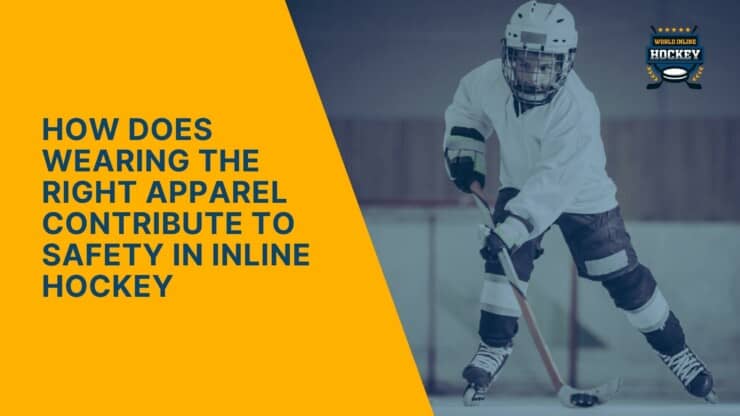How does wearing the right apparel contribute to safety in inline hockey?
This question is often overlooked, yet it’s a critical aspect of this thrilling sport.
Believe me, choosing the appropriate gear isn’t just about looking professional on the rink – it’s about safeguarding your body from potential injuries.
In fact, without proper protection like helmets and shin guards, even seasoned players can find themselves sidelined due to unexpected accidents during games.
The Importance of Safety in Inline Hockey
Inline hockey, a popular contact sport, places significant emphasis on safety.
The national governing sports body sets equipment guidelines for each specific sports activity you’re playing and adherence to these rules is crucial.
The Role of Protective Gear in Preventing Injuries
Wearing the proper gear drastically reduces the risk of injuries while engaging in this fast-paced game.
For detailed information about selecting appropriate shin guard sizes based on your height or weight refer to this comprehensive .
With inline hockey being a high-speed contact sport where players choose their path at lightning speed, it’s essential not only to wear shoulder pads but also other protective gears like elbow pads and knee protection.
As we delve deeper into how wearing the right apparel contributes towards ensuring safety during playtime let us explore some must-have inline hockey accessories next.
Essential Inline Hockey Gear Accessories
The game of inline hockey demands high-quality equipment that can withstand the rigors of this fast-paced contact sport. Investing in superior gear not only enhances performance but also ensures safety.
Choosing the Right Inline Hockey Skates
Selecting suitable inline hockey skates is a critical first step for any player, beginner or experienced alike.
Your choice should be based on factors such as size, weight support, durability and comfort to ensure optimal performance during games.
A well-fitted pair provides stability while maneuvering around players and contributes significantly towards preventing foot injuries.
The Importance of Wearing a Helmet
Helmets are another crucial piece of protective gear in inline hockey. They provide essential protection against potential head injuries that could occur from falls or collisions with other players during matches.
To maximize their effectiveness, helmets must fit properly; if too loose, they might slip off at impact, whereas if too tight, it may cause discomfort over time.
Here’s how you can check your helmet fit correctly.
Padded Shirts Designed Specifically for Inline Skating: A Must-Have?
In addition to traditional shoulder pads, many inline hockey players choose padded shirts designed specifically for their specific sports activity- providing mobility and added protection on the rink.
These specially designed garments offer an extra layer between the body and jersey, reducing chances of injury without compromising movement flexibility – the perfect combination when speed and agility matter most. Check out some top-rated options here: Inline Padded Shirts Review Guide.
Protection Offered by Specific Inline Hockey Apparel
In the world of inline hockey, wearing specific apparel plays a critical role in ensuring player safety.
Padded shirts designed specifically for this sport are an excellent example of such gear.
The Advantages of Padded Shirts Designed Specifically for Inline Skating
These specially designed shirts offer both mobility and protection on the rink. They feature strategically placed padding that shields players from impact during falls or collisions without restricting movement.
Besides their protective function, these padded shirts also provide comfort, which is crucial when engaging in any contact sports activity you’re playing. The breathable material used to make them ensures that players remain cool even under intense action.
However, it should be noted that while these garments offer considerable protection benefits, they cannot replace traditional shoulder pads – rather they complement each other to provide comprehensive upper body coverage if one chooses not to wear shoulder pads.
If anything, they complement each other perfectly – providing comprehensive upper body coverage, especially if one chooses not to wear shoulder pads.
In conclusion,
The right choice of clothing can significantly reduce injury risks associated with inline skating activities, thus enhancing performance and enjoyment levels among participants.
This brings us seamlessly into our next topic: Hand Protection using inline hockey gloves – another vital piece in your arsenal against injuries. Stay tuned.
Understanding Footwear Essentials in Inline Hockey
The specific sports activity you’re playing, such as inline hockey or street hockey, significantly influences the type of footwear required.
In inline skating and ice hockey alike, wearing the right shoes can make a world of difference to your performance and safety.
Selecting Appropriate Shoes for Street Hockey
If you’re into street hockey – a variant of traditional ice hockey played on dry surfaces like asphalt – picking suitable footwear is crucial.
You need sturdy shoes that offer good grip to prevent slipping while also providing comfort during extended play sessions. Here’s an excellent selection worth considering when shopping for ideal footgear.
Picking Suitable Skates for Ice Hockey & Inline Skating
Ice skaters require specialized boots with blades attached underneath designed specifically for gliding over icy surfaces smoothly. Check out these options here.
In contrast, players choose inline skates equipped with two to five wheels arranged in one line by manufacturers who specialize in this field.
This link provides some insights into popular choices among professional athletes.
Safeguarding Against Sports-Related Eye Injuries
When it comes to inline hockey, the importance of eye protection cannot be overstated.
This high-speed contact sport involves flying pucks and accidental hits by other players’ sticks, posing a significant risk for potential damage to eyesight.
The Prevalence of Eye Injuries in Contact Sports
Evidence suggests that sports-related eye injuries are quite common.
Research indicates that approximately 90% of these can be prevented with correct protective gear.
Selecting Suitable Eye Protection Gear for Inline Hockey
Finding suitable eye protection gear is crucial when playing inline skating or any specific sports activity you’re playing.
- Certified helmets with full-face shields provide excellent coverage and should ideally fit snugly without obstructing vision.
- Goggles designed specifically for impact sports offer another viable option – they not only protect against frontal impacts but also from debris entering from sides. Here’s more information on choosing appropriate goggles.
- Avoid regular eyeglasses as they may shatter upon impact leading to further injury. Instead opt for prescription safety glasses if needed.
The Role of National Governing Bodies in Ensuring Safety Standards:
The national governing bodies play an essential role in maintaining safety standards across all levels.
For instance, the national governing body overseeing roller sports including inline hockey, has set forth guidelines regarding mandatory use of protective equipment such as helmets equipped with full face masks among others.
As we move forward towards understanding how wearing proper apparel contributes significantly towards player’s safety during games; let us now delve into why lower body protections like knee guards & shin guards hold immense value especially considering falling is very common while playing this fast-paced game.
Ensuring Lower Body Protection with Knee Protection & Shin Guards
In the fast-paced world of inline hockey, safety is paramount.
Knee protection and shin guards are vital pieces of protective gear that can significantly reduce injuries during this contact sport.
The Importance of Proper Knee Protection in Inline Hockey
Falling is common when playing sports like inline skating. Hence, knee protection plays a critical role in preventing serious injuries to your knees.
Why You Need Shin Guards When Playing Inline Hockey
Besides protecting against fractures, shin guards shield players from painful blows caused by flying pucks or accidental hits by other players’ sticks. This makes them an essential part of any player’s hockey gear collection. Refer to this hockey shin guard chart to find out which size fits you best.
Selecting Quality Protective Gear: The Key Considerations
- Durability – Opt for high-quality materials that can withstand heavy impacts over time.
- Sizing – Ensure they fit properly as ill-fitting equipment may not provide optimal protection.
- Mobility – Your protective gear should allow full range motion without hindering performance on the rink.
In conclusion, investing in quality lower body protectives such as knee protection and shin guards drastically reduces risks associated with falls or collisions while playing sports like inline skating.
FAQs in Relation to How Does Wearing the Right Apparel Contribute to Safety in Inline Hockey
What can you do to prevent inline skating injuries?
Wearing the right protective gear, including a helmet, wrist guards, elbow pads, and knee pads, is crucial. Also, ensure your skates fit well and always warm up before starting.
What should you do if you fall while using in-line skates?
If a fall is imminent during inline skating, try to land on your padded areas – knees or elbows. Avoid putting your hands down, as it may lead to wrist injuries.
How do you wear skating safety?
Safety equipment for inline skating includes helmets that fit snugly but comfortably and wrist guards worn under gloves. Elbow and knee pads should be secure but not overly tight.
How do you wear inline skates?
Your toes should touch the end of the boot when standing up straight. The skate’s cuff must support your ankle firmly without causing discomfort. Always use all laces/hooks for maximum stability.
Conclusion
Inline hockey is a thrilling, high-speed sport that demands agility and skill. But it’s not just about the game; it’s also about safety.
How does wearing the right apparel contribute to safety in inline hockey?
The right apparel plays a crucial role in keeping you safe on the rink. From helmets to gloves, each piece of gear has its purpose.
Helmets protect your head during falls or collisions; inline skates chosen for their size, weight support, durability and comfort ensure optimal performance.
Padded shirts offer mobility while providing protection against impacts. Gloves safeguard hands and fingers from injuries while offering grip control over the stick.
Elbow pads & shin guards shield against fractures during falls or contact with other players, a common occurrence in this fast-paced sport. Footwear essentials can’t be overlooked; specific types are needed for street hockey versus ice hockey games.
At World Inline Hockey, we’re dedicated to helping both beginners learn basics and experienced players take their skills to new heights.
Whether you need advice on choosing equipment or tips on improving technique, we’ve got you covered.
Don’t compromise your safety when playing inline hockey. Equip yourself properly!
Dive into our wealth of resources today at World Inline Hockey. Your journey towards safer play starts here.

